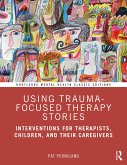- Gebundenes Buch
- Merkliste
- Auf die Merkliste
- Bewerten Bewerten
- Teilen
- Produkt teilen
- Produkterinnerung
- Produkterinnerung
Emotion-Focused Therapy for Trauma (EFTT) is an evidence-based, short-term individual therapy that has proven highly effective in treating clients with trauma through its emphasis on both narrative and emotion processes. Richly illustrated with clinical examples and excerpts from therapy sessions, this book fully integrates theory, research, practice, and training.
Andere Kunden interessierten sich auch für
![Emotionally Focused Couple Therapy with Trauma Survivors Emotionally Focused Couple Therapy with Trauma Survivors]() Susan M JohnsonEmotionally Focused Couple Therapy with Trauma Survivors78,99 €
Susan M JohnsonEmotionally Focused Couple Therapy with Trauma Survivors78,99 €![Forgiveness and Letting Go in Emotion-Focused Therapy Forgiveness and Letting Go in Emotion-Focused Therapy]() Leslie S GreenbergForgiveness and Letting Go in Emotion-Focused Therapy62,99 €
Leslie S GreenbergForgiveness and Letting Go in Emotion-Focused Therapy62,99 €![Sensorimotor-Focused EMDR Sensorimotor-Focused EMDR]() Arthur G O'MalleySensorimotor-Focused EMDR164,99 €
Arthur G O'MalleySensorimotor-Focused EMDR164,99 €![Using Trauma-Focused Therapy Stories Using Trauma-Focused Therapy Stories]() Pat PernicanoUsing Trauma-Focused Therapy Stories45,99 €
Pat PernicanoUsing Trauma-Focused Therapy Stories45,99 €![Emotion Focused Family Therapy with Children and Caregivers Emotion Focused Family Therapy with Children and Caregivers]() Emotion Focused Family Therapy with Children and Caregivers164,99 €
Emotion Focused Family Therapy with Children and Caregivers164,99 €![Trauma Therapy in Context Trauma Therapy in Context]() Trauma Therapy in Context61,99 €
Trauma Therapy in Context61,99 €![Getting Past Your Past Getting Past Your Past]() Francine ShapiroGetting Past Your Past12,99 €
Francine ShapiroGetting Past Your Past12,99 €-
-
-
Emotion-Focused Therapy for Trauma (EFTT) is an evidence-based, short-term individual therapy that has proven highly effective in treating clients with trauma through its emphasis on both narrative and emotion processes. Richly illustrated with clinical examples and excerpts from therapy sessions, this book fully integrates theory, research, practice, and training.
Produktdetails
- Produktdetails
- Verlag: American Psychological Association (APA)
- Seitenzahl: 278
- Erscheinungstermin: 19. Juni 2017
- Englisch
- Abmessung: 264mm x 182mm x 22mm
- Gewicht: 701g
- ISBN-13: 9781433827808
- ISBN-10: 1433827808
- Artikelnr.: 48139259
- Herstellerkennzeichnung
- Libri GmbH
- Europaallee 1
- 36244 Bad Hersfeld
- gpsr@libri.de
- Verlag: American Psychological Association (APA)
- Seitenzahl: 278
- Erscheinungstermin: 19. Juni 2017
- Englisch
- Abmessung: 264mm x 182mm x 22mm
- Gewicht: 701g
- ISBN-13: 9781433827808
- ISBN-10: 1433827808
- Artikelnr.: 48139259
- Herstellerkennzeichnung
- Libri GmbH
- Europaallee 1
- 36244 Bad Hersfeld
- gpsr@libri.de
Sandra C. Paivio, PhD, CPsych, is currently a consultant at the York University Psychology Clinic, where she provides individual psychotherapy, graduate training, and supervision. She is professor emeritus in the psychology department at the University of Windsor, and has more than 20 years of clinical experience. She is one of the developers of emotion-focused therapy, particularly applied to complex trauma (EFTT), and has conducted clinical trials evaluating efficacy and processes of change in EFTT. Dr. Paivio is the author of numerous publications on trauma and psychotherapy, including Working With Emotions in Psychotherapy (with Leslie S. Greenberg), Emotion-Focused Therapy for Complex Trauma: An Integrative Approach (with Antonio Pascual-Leone), and she is featured in two APA videos illustrating EFTT. Dr. Paivio has presented numerous workshops nationally and internationally and provided intensive graduate student and professional training in EFT and EFT specifically for trauma. She also is an invited member of the APA Division 56 (Trauma Psychology) working group developing best practice guidelines for complex trauma and received a Lifetime Achievement Award from the Trauma Section of the Canadian Psychological Association (2014). Dr. Paivio maintains a part-time private practice in Toronto, Ontario, Canada. Lynne E. Angus, PhD, CPsych, is a professor of psychology at York University in Toronto, Ontario, Canada, and a clinical supervisor and therapist at the York University Psychology Clinic. Dr. Angus practices, supervises, and conducts psychotherapy research addressing the contributions of narrative and emotion processes for clinically significant change, particularly in the context of emotion-focused therapy. Over the past 25 years, she has published more than 90 publications addressing the unique contributions of metaphor, narrative, emotion, and meaning-making processes to productive client change, and has conducted numerous training workshops addressing implications for effective therapy practice. She coauthored Working With Narrative in Emotion-Focused Therapy: Changing Stories, Healing Lives (with Leslie S. Greenberg), and was featured in an APA therapy DVD with Sandra C. Paivio, Narrative Processes in Emotion-Focused Therapy for Trauma. Dr. Angus was the senior coeditor of The Handbook of Narrative and Psychotherapy: Practice, Theory, and Research and was also coeditor of Bringing Psychotherapy Research to Life: Understanding Change Through the Work of Leading Clinical Researchers. She is a past president of both the International Society for Psychotherapy Research and the North American Chapter, Society for Psychotherapy Research.
Acknowledgments
Introduction
Part I: Theory and Research
Chapter 1: The Nature of Complex Trauma
Chapter 2: The Unique Contributions of EFTT
Chapter 3: Why Client Storytelling Matters
Chapter 4: A Narrative-Informed Approach to EFTT
Part II: Practice
Chapter 5: Assessing Narrative-Emotion Processes in EFTT
Chapter 6: Principles of Intervention With Narrative-Emotion Processes
Chapter 7: Cultivating the Alliance: Early-Phase EFTT
Chapter 8: Two Intensive Case Analyses: Early-Phase EFTT
Chapter 9: Promoting Self-Development: Middle-Phase EFTT
Chapter 10: Two Intensive Case Analyses: Middle-Phase EFTT
Chapter 11: Resolving Issues With Perpetrators and New Story Outcomes:
Late-Phase EFTT
Chapter12: Two Intensive Case Analyses: Late-Phase EFTT
Afterword: Process-Diagnosis and Marker-Guided Intervention
Appendix: Abbreviated Degree of Resolution Scale
Glossary
References
Index
About the Authors
Introduction
Part I: Theory and Research
Chapter 1: The Nature of Complex Trauma
Chapter 2: The Unique Contributions of EFTT
Chapter 3: Why Client Storytelling Matters
Chapter 4: A Narrative-Informed Approach to EFTT
Part II: Practice
Chapter 5: Assessing Narrative-Emotion Processes in EFTT
Chapter 6: Principles of Intervention With Narrative-Emotion Processes
Chapter 7: Cultivating the Alliance: Early-Phase EFTT
Chapter 8: Two Intensive Case Analyses: Early-Phase EFTT
Chapter 9: Promoting Self-Development: Middle-Phase EFTT
Chapter 10: Two Intensive Case Analyses: Middle-Phase EFTT
Chapter 11: Resolving Issues With Perpetrators and New Story Outcomes:
Late-Phase EFTT
Chapter12: Two Intensive Case Analyses: Late-Phase EFTT
Afterword: Process-Diagnosis and Marker-Guided Intervention
Appendix: Abbreviated Degree of Resolution Scale
Glossary
References
Index
About the Authors
Acknowledgments
Introduction
Part I: Theory and Research
Chapter 1: The Nature of Complex Trauma
Chapter 2: The Unique Contributions of EFTT
Chapter 3: Why Client Storytelling Matters
Chapter 4: A Narrative-Informed Approach to EFTT
Part II: Practice
Chapter 5: Assessing Narrative-Emotion Processes in EFTT
Chapter 6: Principles of Intervention With Narrative-Emotion Processes
Chapter 7: Cultivating the Alliance: Early-Phase EFTT
Chapter 8: Two Intensive Case Analyses: Early-Phase EFTT
Chapter 9: Promoting Self-Development: Middle-Phase EFTT
Chapter 10: Two Intensive Case Analyses: Middle-Phase EFTT
Chapter 11: Resolving Issues With Perpetrators and New Story Outcomes:
Late-Phase EFTT
Chapter12: Two Intensive Case Analyses: Late-Phase EFTT
Afterword: Process-Diagnosis and Marker-Guided Intervention
Appendix: Abbreviated Degree of Resolution Scale
Glossary
References
Index
About the Authors
Introduction
Part I: Theory and Research
Chapter 1: The Nature of Complex Trauma
Chapter 2: The Unique Contributions of EFTT
Chapter 3: Why Client Storytelling Matters
Chapter 4: A Narrative-Informed Approach to EFTT
Part II: Practice
Chapter 5: Assessing Narrative-Emotion Processes in EFTT
Chapter 6: Principles of Intervention With Narrative-Emotion Processes
Chapter 7: Cultivating the Alliance: Early-Phase EFTT
Chapter 8: Two Intensive Case Analyses: Early-Phase EFTT
Chapter 9: Promoting Self-Development: Middle-Phase EFTT
Chapter 10: Two Intensive Case Analyses: Middle-Phase EFTT
Chapter 11: Resolving Issues With Perpetrators and New Story Outcomes:
Late-Phase EFTT
Chapter12: Two Intensive Case Analyses: Late-Phase EFTT
Afterword: Process-Diagnosis and Marker-Guided Intervention
Appendix: Abbreviated Degree of Resolution Scale
Glossary
References
Index
About the Authors








